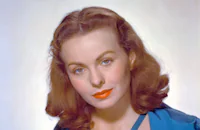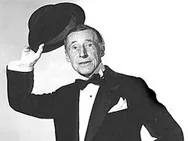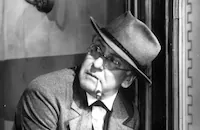You Were Meant for Me

Brief Synopsis
Cast & Crew
Lloyd Bacon
Jeanne Crain
Dan Dailey
Oscar Levant
Barbara Lawrence
Selena Royle
Film Details
Technical Specs

Synopsis
In 1929, in Bloomington, Illinois, Peggy Mayhew, her escort Roy and friends Louise Crane and Eddie go to a dance at the Electric Gardens where Chuck Arnold and His Sophisticates are appearing. Peggy is stunned by Chuck's versatility; he sings, plays trumpet, clarinet and trombone, as well as leading the band. Peggy wins a lucky number drawing, and when the prizes are presented by Chuck, she instantly falls in love with him, kissing him in front of all the dancers. Later, Chuck invites Peggy to come to Peoria, where the band will be playing the next evening. Peggy's parents, Andrew and Cora Mayhew, tell her at dinner the following evening that the whole town is talking about her behavior at the dance. Ignoring her parents' admonitions, Peggy sneaks out and takes a bus to Peoria, but is denied admission to the dance as she is unescorted. She spots Chuck's manager, Oscar, and asks him to take a note to Chuck, but Oscar later tears it up to protect Peggy from engaging in a one-night stand with the musician. She waits until the dance is over to meet Chuck, and after she misses her bus home, she accepts his offer to ride home in the band bus. The next morning, Mrs. Mayhew finds Peggy and Chuck asleep on her sofa, and is shocked when they wake up and announce that they were married a few hours ago. Peggy goes on the road with Chuck and the band. The band does well in the Midwest, and Chuck tells Peggy that they have been booked into the Pennsylvania Hotel in New York. Peggy shows him the Variety headline, "Wall St. Lays An Egg," but he dismisses this as just a little flurry in the market. After he fails to keep a dinner date because he is auditioning a new song, Chuck finds Peggy sobbing, upset because he is always immersed in his music. Chuck promises her that when they get to New York things will be a lot better. However, Oscar brings Chuck a telegram which states that their New York engagement has been canceled. Hurt by the stock market crash, the tour falls apart, forcing Peggy and Chuck to return to Bloomington to stay with her parents. When Peggy meets some of her old friends at the drug store, where one of the recordings Chuck and the band made is being played, Chuck and Peggy pretend to be "flush." Peggy is particularly concerned about Chuck's nonchalant approach to money, and friction develops between Peggy and her mother over Chuck's unwillingness to work. The company for which the band has recorded then goes bankrupt, so there will be no more royalty checks to help support them. Peggy learns that she is pregnant and, while filling a prescription at the drug store, sees Louise and the others, who make fun of the fact that none of the major bookings Chuck has been boasting about have materialized. After Peggy's father, who has been forced to lay off men from the brick works he owns, puts himself back on the production line, Oscar telegrams that he has a booking for the band at a vaudeville theater in Chicago. Peggy wants Chuck to accept but the prideful Chuck refuses. Fed up, Peggy accuses Chuck of sponging off her family, and Chuck packs and heads for the railroad station. As Peggy's mother comforts her, Oscar arrives looking for Chuck, and Peggy tells him what has happened. That night Mr. Mayhew returns home from the brick works and brings along a new employee--Chuck--and Peggy, Chuck and Oscar are reunited. Three years later, the economy has picked up and Oscar is vice-president in charge of sales at the Mayhew brick works. In New York, Peggy, Louise and Eddie enjoy watching Chuck and the band play during their successful engagement at the Pennsylvania Hotel. Peggy and Chuck and their three-year-old son now have a bright future ahead of them.

Director

Lloyd Bacon
Cast

Jeanne Crain

Dan Dailey

Oscar Levant

Barbara Lawrence

Selena Royle

Percy Kilbride

Herbert Anderson
Lee Macgregor
Harry Barris
William Sheehan
Dick Winslow
Barney Elmore
Tiny Timbrell
Bob Mccord
Maurice Kelly
Michael Towne
Billy Snyder
Perc Launders
Les Clark
Kenny Williams
Charles Tannen
Morgan Farley
John Fontaine
Janet King
Charles Flickinger
Dick Ryan

Erskine Sanford
Kenneth Niles

Marion Marshall
Ann Frederick
Charles Owens
Otto Forrest
Milton Gowman
Ben Pollock
John C. "kay" Garrett
Crew
Milton Ager
Fred E. Ahlert
Bill Atkinson
Harry Brooks
Nacio Herb Brown
Irving Caesar
Jimmy Campbell
Russ Cheever
Les Clark
Reginald Connelly
Dan Dailey
Valentine Davies
Peter De Rose
Kathleen Fagan
Paul S. Fox
Arthur Freed
George Gershwin
Earle Hagen
Charles Hall
Jimmy Heaton
Roger Heman
Charles Henderson
Charles Henderson
Richard Irvine
Roger Wolfe Kahn
Fred Kohlmar
Charles Le Maire
Eddie Ledgerwood
George Leverett
Thomas Little
Cliff Maupin
Joseph Meyer
Victor Milner
Cyril J. Mockridge
Elick Moll
Kay Nelson
Lionel Newman
Ray Noble
Ben Nye
Edward Powell
Andy Razaf
Kay Reed
William Reynolds
Bill Riddle
Ad Schaumer
Fred Sersen
Ted Shapiro
Roger Shearman
Herbert Spencer
Urban Thielman
Roy Turk
Thomas "fats" Waller
E. Clayton Ward
Lyle Wheeler
Kenny Williams
Jack Yellen
Darryl F. Zanuck

Film Details
Technical Specs

Articles
You Were Meant for Me
The setting is the peaceful Indiana town of Bloomington, where young folks hang out at malt shops and dance to the tunes of their favorite swing orchestras. The opening scene finds Chuck Arnold and His Sophisticates on the bandstand, delighting the crowd with lively jazz. Chuck (Dan Dailey) is a quite a heartthrob in Midwestern circles, the narrator tells us, pleasing admirers "from Kokomo, Indiana, to Keokuk, Iowa" with his "silver megaphone and golden smile."
He's not the brightest star in the musical firmament, though, so he relies on gimmicks to boost his audience. Tonight it's a "lucky-number drawing," and the lucky winner turns out to be pretty Peggy Mayhew (Jeanne Crain), who wins a bonanza of prizes including a book of trading stamps, a jar of face cream, and a flimsy lingerie item. After bestowing these treasures and serenading Peggy with the movie's title tune, Chuck asks if she has a prize for him, and she impulsively gives him a kiss. Her boyfriend scowls, Chuck sighs, and the story leaps into high gear. A few scenes later, Chuck and Peggy are husband and wife, and she starts learning that life can be very demanding for the spouse of a touring bandleader, especially when the bandleader is more confident of his popularity than the facts warrant.
You Were Meant for Me was meant as a timely follow-up to a pair of period musicals that had performed well for Twentieth Century Fox in the past two years: Henry King's Margie (1946), starring Crain as a 1920s teenager, and Walter Lang's Mother Wore Tights (1947), starring Dailey as a vaudeville star who marries a chorus girl. You Were Meant for Me is a relatively low-key picture, relying on the low-key charisma of Crain and Dailey to keep the story engaging and the rhythms infectious. Both are fully up to the task.
Still in the early stage of her career, Crain had chalked up solid musical experience in Lang's State Fair (1945) and Otto Preminger's Centennial Summer (1946), and she has more than enough ingénue beauty and acting smarts to make Peggy genial and persuasive as both a girl with a crush and a woman with growing responsibilities. Her performance is all the more impressive considering that she was just returning from a year and a half of maternity leave. Dailey was a decade older than Crain, and he looks it, but his toothy smile and lightweight personality make him a perfectly good partner for his up-and-coming costar, who steals the picture anyway.
Bacon was a versatile director who worked in many genres, but he's best remembered for backstage musicals made during his long stint at Warner Bros., where he worked from 1925 until his move to Twentieth Century-Fox in 1944. His most celebrated achievement is the 1933 classic 42nd Street, which reaped huge dividends from Busby Berkeley's phenomenal choreography. You Were Meant for Me is a modest remake of 42nd Street in some ways. Again there's lots of music and dance; again the story centers on entertainers under pressure; and again their biggest challenges are financial ones, sparked by the same Great Depression that cast a dark shadow over show business in the earlier film.
You Were Meant for Me is actually a semi-remake of another Fox musical - Archie Mayo's Orchestra Wives, released in 1942 - and it differs from 42nd Street in important ways. For one thing, the choreographers of the dance routines - Les Clark, in his only shot at the job, and Dailey, busy starring in the film - fall laughably short of Berkeley's lofty standard. For another, 42nd Street has fabulous production numbers bunched in the last part of the picture, whereas there are no production numbers in You Were Meant for Me, just small-scale bits scattered through the story. For yet another, 42nd Street takes place in the depths of the Depression, and the characters all know that if the big show flops, it may be a mighty long time before they work again. By contrast, the crash of 1929 sneaks up on Chuck, who heads straight for Deep Denial and needs to be dragged out by his increasingly concerned wife, his long-suffering manager, and even his father-in-law, another stubborn escapist who'd rather play with his stamp album than think about money. The shock of the crash and the escalating woes of the Depression provide the picture's dramatic undertone, capped with a happy ending when Chuck turns into a real grownup at last.
Along with Crain and Dailey, the main attraction of You Were Meant for Me is Oscar Levant, the famously eccentric pianist, wit, and character actor who enlivened a dozen movies of the 1940s and 1950s. He delivers a wry, touching performance as Oscar Hoffman, the band's manager, and gives an electrifying rendition of an excerpt from the Concerto in F for Piano and Orchestra by George Gershwin, a composer he loved. Percy Kilbride, famous as Pa Kettle in later years, is also memorable as Peggy's unsophisticated dad. (Some claim that Marilyn Monroe is visible in a crowd scene, but my eagle eyes haven't spotted her.)
The movie's music is irresistible, even if standbys like "Happy Days Are Here Again" and "Ain't She Sweet?" rank pretty low on the originality chart. "Crazy Rhythm" has craziness and rhythm galore, and a high-octane performance of "Ain't Misbehavin'," the unforgettable Fats Waller hit, is downright thrilling. Amiable standards like "I'll Get By" and "Good Night, Sweetheart" add additional toe tapping, and if you love the Roaring Twenties you'll enjoy them even more.
Director: Lloyd Bacon
Producer: Fred Kohlmar
Screenplay: Elick Moll and Valentine Davies
Cinematographer: Victor Milner
Film Editing: William Reynolds
Art Direction: Lyle Wheeler, Richard Irvine
Musical Director: Lionel Newman
Choreography: Dan Dailey and Les Clark With: Jeanne Crain (Peggy Mayhew), Dan Dailey (Chuck Arnold), Oscar Levant (Oscar Hoffman), Barbara Lawrence (Louise Crane), Selena Royle (Cora Mayhew), Percy Kilbride (Andrew Mayhew), Herbert Anderson (Eddie).
BW-92m.

You Were Meant for Me
Quotes
Trivia
Notes
This film's working titles were The Flapper Age and The Flaming Age. A contemporary source lists Kenny Williams as a dance director and credits George Leverett instead of E. Clayton Ward as a sound recorder. According to documents in the Twentieth Century-Fox Records of the Legal Department Collection, located at the UCLA Arts-Special Collections Library, in May 1948 Famous Records of Newark, NJ, sued the studio for stating in the film that a Famous Records company had gone bankrupt. The Newark company sought $150,000 in damages and withdrawal of the film. The suit was settled in September 1949 with Famous Records receiving $350. You Were Meant for Me was shot after but released before Dan Dailey's Give My Regards to Broadway in an apparent attempt to capitalize on the success of Jeanne Crain's Margie and Dailey's Mother Wore Tights, which were both period musicals (see entries above). You Were Meant for Me marked Crain's return to the studio after an eighteen-month maternity leave. Dan Dailey reprised his role in a June 28, 1948 Lux Radio Theatre broadcast, co-starring Donna Reed. You Were Meant for Me is a partial, uncredited remake of the 1942 Twentieth Century-Fox production Orchestra Wives.














